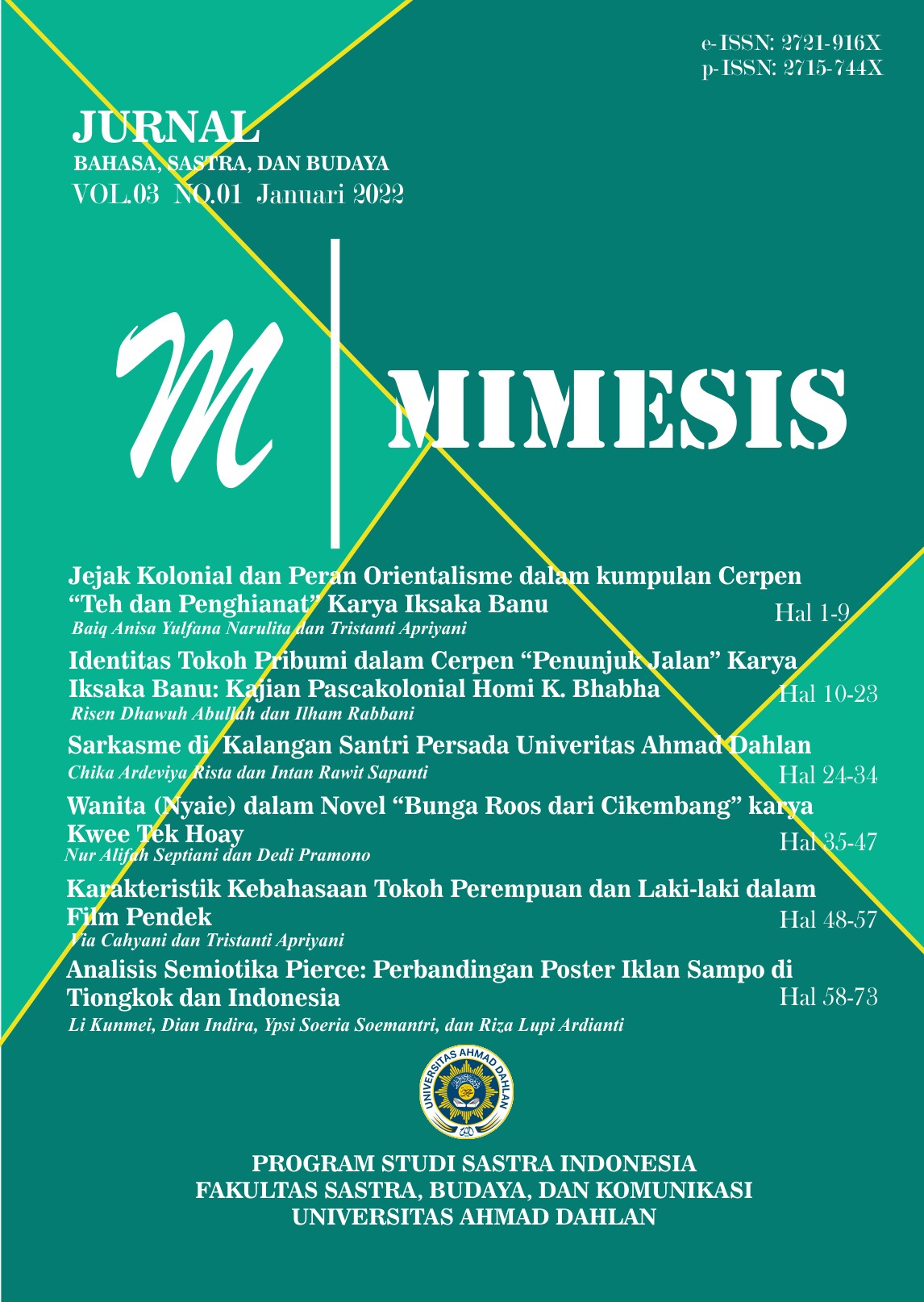JEJAK KOLONIAL DAN PERAN ORIENTALISME DALAM KUMPULAN CERPEN TEH DAN PENGHIANAT KARYA IKSAKA BANU
DOI:
https://doi.org/10.12928/mms.v3i1.4893Keywords:
Orientalism, Colonial, Short storyAbstract
The colonial period was the planting of orientalist concepts towards the East, where the differences between East and West were very much shown. This of course did not escape the views of several Indonesian writers and writers who then tried to record this phenomenon in their literary works. One of the Indonesian writers, Iksaka Banu, who discusses the conflict between the natives and the Dutch, the Dutch and ethnic Chinese, to the conflict between the Dutch and the Dutch in various experiences and one of them is Iksaka Banu's latest collection of short stories entitled Teh dan Penghianat which was just published in 2019. This research using qualitative descriptive method aims to describe the form and role of orientalism in the collection of Teh and the traitor by Iksaka Banu by taking two short stories as material for analysis, namely 'Teh dan Pengianat' and ‘Belenggu Emas’. The data collection technique was carried out by document study techniques in short stories, namely by collecting data in the form of document archives, including books and journals. Meanwhile, the data triangulation process in the form of theoretical triangulation, data source triangulation and researcher triangulation, was carried out by the author to check the validity of the data. By using the theory put forward by Edward Said, this research concludes that in the short story Teh dan Pengtangan, there can be found several depictions of the East in the context of orientalism which symbolized by indigenous and ethnic Chinese. Meanwhile, in the short story Belenggu Emas, the depiction of the east in the context of orientalism is described as an indigenous community that needs to be improved or educatedReferences
Apriyani, T., & Cahyani, V. (2021). Surat edaran dirjen dikti tentang imbauan pembelajaran daring dan sosialisasi undang-undang cipta kerja: analisis wacana kritis. Suar Betang, 16(2), 233–242.
Banu, I. (2019). Teh dan Penghianat. KPG (Kepustakaan Populer Gramedia).
Harjito. (2014). Hegemoni Gramci dalam sastra Indonesia: Student Hijo, nasionalisme, dan wacana kolonial. UPGRIS Press.
Moleong, L. (2018). Metodologi Penelitian Kualitatif. Remaja Rosdakarya.
Pratiwi, W. A., & Apriyani, T. (2020). Homo Sacer Orang Pegaten Dalam Novel Kubah Karya Ahmad Tohari ( Perspektif Giorgio Agamben ). Mimesis, I (2), 66–76.
Ratna, N. K. (2018). Teori, metode, dan teknik penelitian sastra. Pustaka Pelajar.
Said, E. (2001). Orientalisme (Terj). Penerbit Pustaka.
Said, E. (2014). Peran Intelektual, Kuliah-kuliah Reith Tahun 1993 (trj). Yayasan Obor Indonesia.
Sugitario, E. (2008). Undang-undang Nomor 12 Tahun 2006 tentang Kewarganegaraan Repbulik Indonesia, dan Undang-undang Nomor 23 Tahun 2006 tentang Administrasi Kependudukan sebagai Perekat Persatuan dan Kesatuan Bangsa.
Downloads
Published
Issue
Section
License
Copyright (c) 2022 Baiq Annisa Yulfana Nalurita

This work is licensed under a Creative Commons Attribution-ShareAlike 4.0 International License.
License and Copyright Agreement
In submitting the manuscript to the journal, the authors certify that:
- They are authorized by their co-authors to enter into these arrangements.
- The work described has not been formally published before, except in the form of an abstract or as part of a published lecture, review, thesis, or overlay journal.
- That it is not under consideration for publication elsewhere,
- That its publication has been approved by all the author(s) and by the responsible authorities tacitly or explicitly of the institutes where the work has been carried out.
- They secure the right to reproduce any material that has already been published or copyrighted elsewhere.
- They agree to the following license and copyright agreement.
Copyright
Authors who publish with Mimesis agree to the following terms:
- Authors retain copyright and grant the journal right of first publication with the work simultaneously licensed under a Creative Commons Attribution License (CC BY-SA 4.0) that allows others to share the work with an acknowledgment of the work's authorship and initial publication in this journal.
- Authors are able to enter into separate, additional contractual arrangements for the non-exclusive distribution of the journal's published version of the work (e.g., post it to an institutional repository or publish it in a book), with an acknowledgment of its initial publication in this journal.
- Authors are permitted and encouraged to post their work online (e.g., in institutional repositories or on their website) prior to and during the submission process, as it can lead to productive exchanges, as well as earlier and greater citation of published work.












